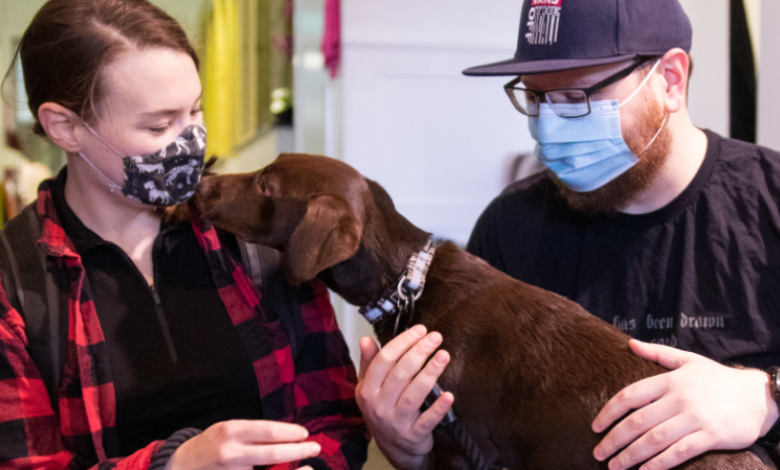Pet Therapy Access via NDIS in Melbourne Suburbs

Pet therapy has recently received a lot of attention in Australia as a holistic method of helping people with impairments, mental health issues, and developmental abnormalities. Pet therapy, also known as Animal-Assisted Therapy (AAT), is a systematic contact between a human and a trained animal that aims to improve emotional, cognitive, and physical performance.
Access to pet therapy through the NDIS is becoming more realistic in Melbourne’s suburbs, providing individuals with a comfortable and successful avenue to better well-being.
Recent NDIS research shows that animal-assisted therapy, like sessions with dogs or horses, can really help kids on the autism spectrum. These animals offer a calming, judgment-free space that supports emotional growth, social interaction, and skill-building. It’s one of the reasons why pet therapy is becoming more popular for families using NDIS plans.
Understanding pet therapy and its benefits
Pet therapy is more than just playing with your pet. It consists of carefully supervised sessions mediated by specialists in which the animal is included in a larger treatment plan. Dogs, cats, rabbits, and even horses are common therapy animals, and they are all trained to engage with humans in relaxing, emotionally supportive, and, in some cases, physically therapeutic ways.
The advantages of pet therapy are widely known. Therapy animals help lessen anxiety and sensory overload in people with autism spectrum disorder (ASD). Having an animal friend helps people with mental health conditions like depression or PTSD feel less alone, more motivated, and more trustworthy.
In addition, working on motor skills or doing basic physical activities while bonding with an animal can also be motivating for kids and adults with physical limitations.
Among the frequently mentioned advantages are:
- Lower levels of worry and stress
- Enhanced communication and social interaction abilities
- Improved emotional control and self-worth
- Enhanced drive and involvement in treatment sessions
- Reduced isolation and elevated mood
See also: Same Day HIV Test Dubai: Ensuring Fast, Reliable, and Private Results
The NDIS Supports Pet Therapy
NDIS is Australia’s principal assistance system for those with permanent and substantial disabilities. It funds a wide range of services and programs that promote independence and community participation.
Pet therapy may be paid under the NDIS provided it is deemed a “reasonable and necessary” support that is in line with the participant’s goals. The therapy must be administered by a qualified therapist, and the animal must be properly trained and certified.
Funding for regular pet ownership is rarely accepted, but therapy with an animal that is demonstrated to have therapeutic benefits may be covered.
For example, a participant with severe social anxiety who improves their social skills through regular animal-assisted therapy may be eligible for continuous support. Similarly, people with traumatic histories may be eligible for pet therapy as part of their psychological support programs.
How to include pet therapy in an NDIS plan
To get pet therapy through the NDIS, a participant must first establish that the therapy is consistent with their recorded goals. This could include objectives such as boosting emotional well-being, improving communication skills, or increasing engagement in daily activities.
The next stage is obtaining proof. Health professionals, such as occupational therapists, psychologists, and speech therapists, can submit written reports detailing how pet therapy helps the participant develop or recover. When the efficacy of the therapy is supported by expert advice and evident connections to the participant’s disability-related requirements, the NDIS is more likely to authorize funding.
Participants can schedule many sessions with licensed therapy providers after being included in the plan. In addition to having experience providing therapy services, it’s critical to pick a provider who can guarantee that the animals used are qualified, trained, and appropriate for working with vulnerable people.
Accessibility in Melbourne Suburbs
Pet therapy is no longer exclusive to Melbourne’s city core. Suburban areas are increasingly embracing this supportive approach, allowing those with disabilities to receive therapy closer to home.
Key advancements include:
- Wider Availability
Pet therapy services are becoming more widespread in suburbs such as Dandenong, Frankston, Werribee, and Ringwood.
- Local Therapy Providers:
More suburban facilities are now collaborating with certified animal therapists to provide accessible assistance.
- Mobile Services:
In-home pet therapy options are available, making travel easier for participants.
- Community Support
Local councils and community centers encourage pet-assisted projects through mental health and disability assistance programs.
- Tailored Services:
Suburban programs frequently address unique neighborhood needs, providing a more tailored approach.
Factors to Consider When Selecting a Pet Therapy Provider
The professionalism of the pet therapy practitioner has a significant impact on the quality of the sessions. When selecting a treatment service, participants and their caregivers should consider the following qualities:
- Qualified Staff:
Therapists should have relevant experience and training in health, mental health, and disability support.
- Animal Certification:
Therapy animals must be trained, quiet, and comfortable working in therapeutic settings.
- Safety Policies:
Providers should have established cleanliness, safety, and animal welfare policies.
- NDIS Knowledge:
A provider who is knowledgeable about NDIS requirements will be able to assist clients with funding approvals and service reservations more effectively.
Asking other users of the service for their opinions is also beneficial. There are active forums and support groups in many Melbourne suburbs where members exchange stories and suggest nearby services.
The Future of Pet Therapy in the Melbourne Disability Sector
As research continues to show the benefits of animal-assisted treatment, its integration within the NDIS framework is likely to increase. Pet therapy is becoming a popular and effective support option in Melbourne suburbs, as inclusive and innovative therapeutic models become more prevalent.
Making pet therapy a common component of disability support programs involves several components, including provider training, financing support, and community information. Therapy animals have a special and potent ability to support development and healing. This is especially true when combined with the advantages of companionship, emotional connection, and nonjudgmental interaction.
Support coordinators, families, and caregivers should keep pushing for more access to these therapies and supporting their inclusion in service plans.
Final Thoughts
Pet therapy is emerging as a transforming tool for people with impairments in Melbourne’s suburbs. Combining animals’ unconditional support with professional therapy direction provides a safe and rewarding environment for emotional, social, and physical development.
Individuals can now incorporate animal-assisted therapy into their journey toward increased independence and well-being thanks to the NDIS and a growing network of trained providers.
If you’re looking for a caring and skilled NDIS provider Melbourne residents can rely on, select one that understands the healing power of pet therapy and is dedicated to providing holistic, individualized care.

